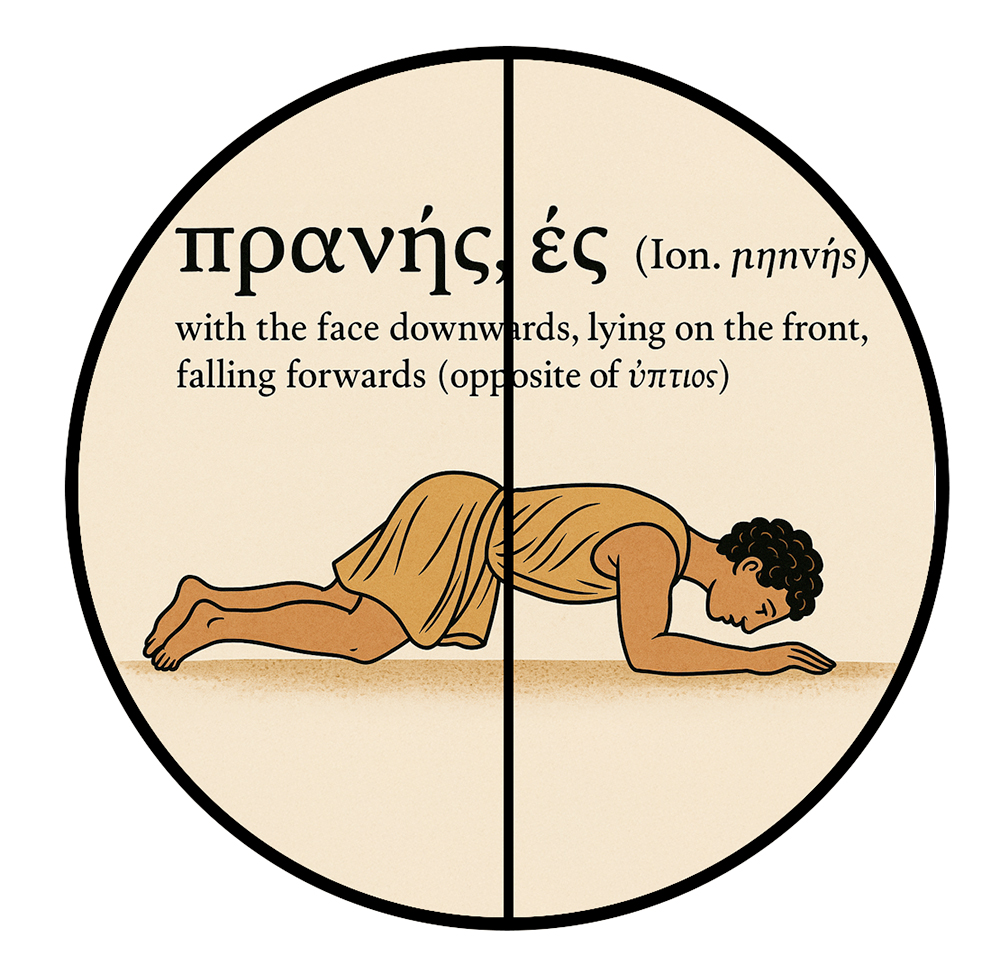 Acts 1:18
Acts 1:18

|
Strongs 3778
[list] Λογεῖον Perseus Houtos Οὗτος This DPro-NMS |
|
Strongs 3303
[list] Λογεῖον Perseus men μὲν indeed Conj |
|
Strongs 3767
[list] Λογεῖον Perseus oun οὖν therefore Conj |
|
Strongs 2932
[list] Λογεῖον Perseus ektēsato ἐκτήσατο acquired/won V-AIM-3S |
|
Strongs 5564
[list] Λογεῖον Perseus chōrion χωρίον land N-ANS |
|
Strongs 1537
[list] Λογεῖον Perseus ek ἐκ from out Prep |
|
Strongs 3408
[list] Λογεῖον Perseus misthou μισθοῦ wage N-GMS |
|
Strongs 3588
[list] Λογεῖον Perseus tēs τῆς the Art-GFS |
|
Strongs 93
[list] Λογεῖον Perseus adikias ἀδικίας unrighteousness N-GFS |
|
Strongs 2532
[list] Λογεῖον Perseus kai καὶ and Conj |
|
Strongs 4248
[list] Λογεῖον Perseus prēnēs πρηνὴς headlong Adj-NMS |
|
Strongs 1096
[list] Λογεῖον Perseus genomenos γενόμενος he who has become V-APM-NMS |
|
Strongs 2997
[list] Λογεῖον Perseus elakēsen ἐλάκησεν shrieked/rang out V-AIA-3S |
|
Strongs 3319
[list] Λογεῖον Perseus mesos μέσος in middle Adj-NMS |
|
Strongs 2532
[list] Λογεῖον Perseus kai καὶ and Conj |
|
Strongs 1632
[list] Λογεῖον Perseus exechythē ἐξεχύθη poured out V-AIP-3S |
|
Strongs 3956
[list] Λογεῖον Perseus panta πάντα all Adj-NNP |
|
Strongs 3588
[list] Λογεῖον Perseus ta τὰ the Art-NNP |
|
Strongs 4698
[list] Λογεῖον Perseus splanchna σπλάγχνα heart N-NNP |
|
Strongs 846
[list] Λογεῖον Perseus autou αὐτοῦ himself PPro-GM3S |
Working for Hire for the Unjust One
This one, indeed therefore, earned a plot of ground from out of a wage of the Unjust One, and he who has become face down, he screamed/rang out in the Middle, and poured out all the Bowels of himself.4
σπλάγχνα - guts, bowels
And he is saying, 'What have you made? A voice of the blood of the brother of yourself, are those who scream ("Tsoaqim") toward myself from out of the Ground of Adam ("Adamah")!'
(Genesis 4:10 RBT)Truly this therefore purchased a place from the wages of iniquity; and being bent forward, he brake in pieces in the midst, and all his entrails were poured out.
Indeed, then, this one bought a field out of the reward of unrighteousness; and falling headlong, he burst in the middle, and poured out all his bowels.
(Now this man acquired a field with the reward of his wickedness, and falling headlong he burst open in the middle and all his bowels gushed out.
Footnotes
| 4 | Working for Hire The phrase μισθοῦ τῆς ἀδικίας is best understood not merely as the condemnatory “wages of injustice” or "reward of unrighteousness" (a very abstract sense), but more precisely as “the wages received from the unjust one.” Note the usage of the definite article. The genitive τῆς ἀδικίας functions here as a possessive or personal genitive, indicating the source or agent—namely, an unjust person or master. This reading implies a concrete social relationship in which the subject is employed by, or working for, an unjust employer rather than simply engaging in wrongful activity for any reward. Such a genitive construction, denoting the giver or possessor of the wages, is common in classical Greek usage (cf. Thuc. 1.123; Soph. Aj. 968). Consequently, μισθοῦ τῆς ἀδικίας connotes a transactional dynamic wherein the individual receives compensation from an unjust principal, thus emphasizing servitude or employment under unjust authority rather than abstract injustice. This interpretation accords with broader semantic patterns of μισθός and genitive agency in ancient Greek literature. Won a Plot, Acquired by effort Cf. Pind. Nem. 9.52: φιάλαις, ἅς ποθʼ ἵπποι κτησάμεναι Χρομίῳ πέμψαν, where κτάομαι (aor. mid. part.) denotes the acquisition of victory prizes in equestrian contests; Isthm. 9.4: σὺν θεῶν δέ νιν αἴσᾳ Ὕλλου τε καὶ Αἰγιμιοῦ Δωριεὺς ἐλθὼν στρατὸς ἐκτήσατο (mss.; ἐκτίσσατο Herm.), describing the Dorian conquest of territory, with the verb connoting military acquisition; and Pae. 2.59: τοὶ σὺν πολέμῳ κτησάμ[ενοι] χθόνα πολύδωρον, where κτάομαι again refers to winning land by force. These passages illustrate a semantic range centered on the procurement of land or goods through effort, contest, or divine favor. This usage informs the reading of ἐκτήσατο χωρίον in Acts 1:18, where the phrase carries ironic overtones. The verb traditionally connotes heroic or noble acquisition, yet here it is paired with μισθὸς τῆς ἀδικίας, a wage of an unjust one. The verb λάσκω (with imperfect ἔλασκον, future λᾰκήσομαι, and perfect λέληκα) primarily denotes the production of sharp or loud sounds and is especially used to describe vocal utterances by humans. Rather than signifying any physical action of “bursting open,” it is attested in classical and tragic literature as meaning “to shout,” “to scream,” or “to cry aloud.” This usage includes the utterance of oracles or prophetic proclamations (e.g., Aeschylus Agamemnon 1426; Sophocles Trachiniae 824; Aristophanes Plutus 39). The verb’s semantic domain thus centers on the emission of vocal sounds conveying emotion, alarm, or divine communication, rather than any material rupture or explosion of the body or objects. Summary of meanings of λάσκω:
(cf. LSJ λάσκω) |